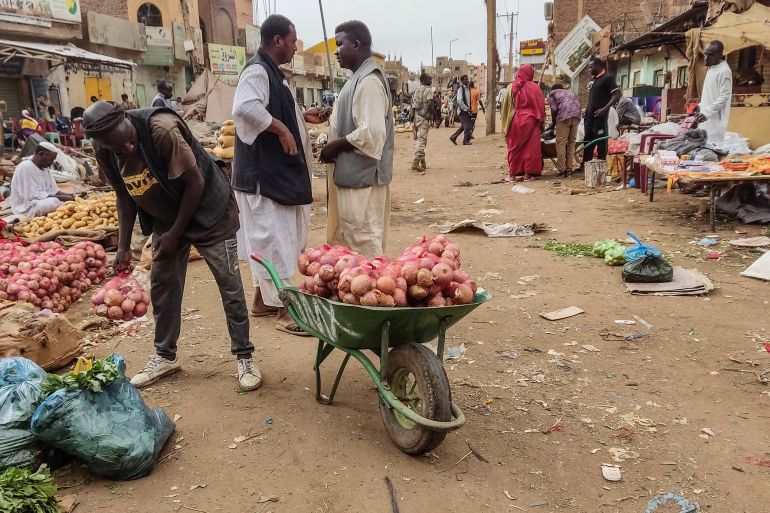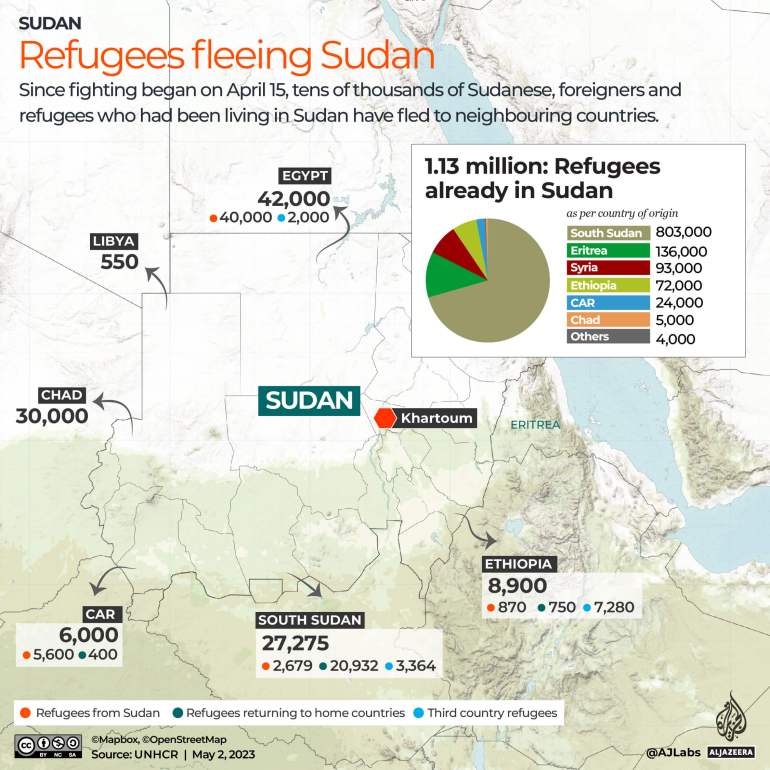Sudan’s 24-hour truce: ‘We don’t hear the sound of guns’
Aid agencies are hoping to deliver aid during the truce period but will need a guarantee of safe passage from warring sides.

Sudan’s capital of Khartoum was quiet after the start of a 24-hour ceasefire – the latest attempt to end fighting between the Sudanese army and the Rapid Support Forces (RSF) paramilitary group.
“Since the war started [April 15], this is the first time hours go by and we don’t hear the sound of guns. Today was completely different,” said Hamed Ibrahim, who lives in east Khartoum.
Keep reading
list of 4 itemsMediators announce 24-hour Sudan ceasefire from early Saturday
Fighting in South Sudan camp leaves 13 displaced people dead: UN
Q&A: RSF adviser on Sudan ceasefire, Wagner and civilian killings
In one Khartoum market, people were seen scrambling to stock up on fruit and other basic goods.
“The truce is a chance for us to get some food supplies after we lived on rationed quantities in recent days,” said one of the shoppers Mohamad Radwan.
The United States and Saudi Arabia-brokered ceasefire took effect from 6am (04:00 GMT) on Saturday with hopes by the mediators that a pause in fighting will facilitate the safe passage of desperately needed humanitarian aid across the country.
The ceasefire is also hoped to halt the fighting that has been raging since April 15 when a rivalry between army chief Abdel Fattah al-Burhan and RSF commander Mohamed Hamdan “Hemedti” Dagalo exploded into open warfare.
A string of previous ceasefires have fallen through with both sides accusing the other of violations. This latest truce is due to expire at 6am (0400 GMT) on Sunday.
“We have not been able to hear any sound of artillery shelling,” Al Jazeera’s Hiba Morgan reported said from Omdurman, located on the outskirts of the Sudanese capital.
The US and Saudi Arabia said they shared “frustration” over the past violations, threatening to dismantle ceasefire talks if fighting continues.
Residents are waiting to see how the ceasefire will play out before they attempt to make a move, whether to stock up on basic commodities, or to try and leave Khartoum because of the continuing fighting, Morgan said.
“A one-day truce is much less than we aspire for,” a resident of Khartoum North, Mahmud Bashir, said. “We look forward to an end to this damned war.”
In the week before the ceasefire, fighting ramped up around crucial army bases, with the RSF claiming to have taken control of an arms manufacturing complex in the southern part of the capital.
Residents reported anti-aircraft missiles firing in southern Khartoum and the Sharg el-Nil district across the Nile, which came under air attack just before the ceasefire took effect.
“Many residents say that the situation is getting desperate. We’re talking about some residential areas where there are people remaining, but there’s a lack of access to basic necessities,” said Morgan.
Hajar Youssef said she had gone out in search of an open pharmacy to buy insulin for her mother, who has diabetes. “Unfortunately, I did not find one.”
Aid agencies are hoping to intervene to alleviate some of the shortages, but will need a guarantee of safe passage from the warring sides to reach some parts of the capital.
Bus station employee Ali Issa said many people were using the truce to flee the capital for the relative safety of the provinces. “Today numbers … have risen significantly, maybe even doubled,” he said.
Khartoum residents told Morgan they hoped the 24-hour truce would allow some humanitarian aid to come in, especially medical assistance for those who are desperately in need, including those injured in the fighting.
